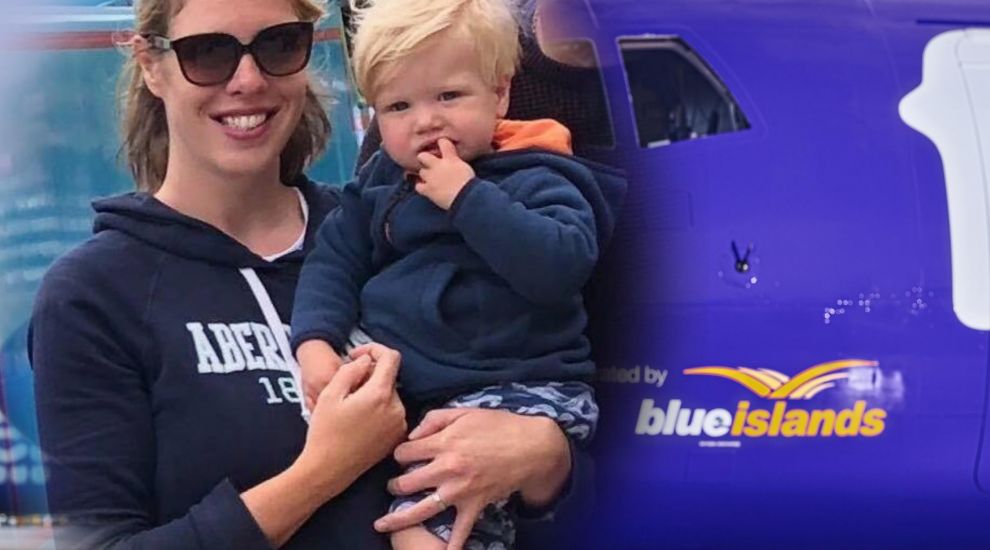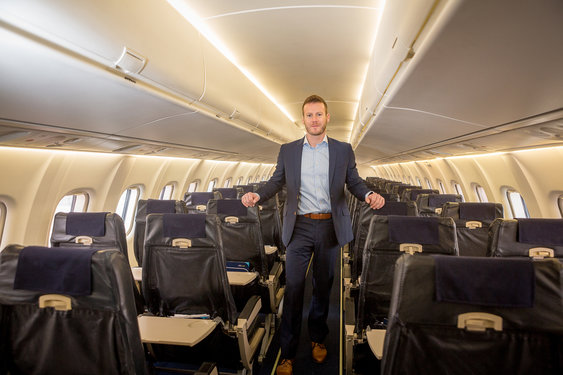

A former air hostess who was dismissed from her ‘dream job’ after giving birth has called for “compassion and understanding” from employers after winning Jersey’s first ever maternity-related discrimination case against a pan-island airline.
Blue Islands were yesterday ordered to pay Andrea Elcock £7,821.45 in a landmark judgement by the Employment and Discrimination Tribunal, which found that the airline had unfairly dismissed her for maternity-related reasons, arguing that employers must “keep the door open” to their staff, even if signed off for long periods.
The mother-of-three says she was “devastated” to be fired from her role as a Blue Islands cabin crew member in autumn 2017 after four years working for the company.
“Being an air hostess, it was my life, I loved it, and I can’t do it anywhere else. For them to take that away from me, just because I had a baby, broke my heart. It really broke me for a long time,” she opened up to Express.

Pictured: Mrs Elcock with her children, Ward (1), Florence (7) and Poppy-Anne (11).
At the time, she had just given birth to her third child – Ward (1) – and was suffering the effects of Ehlers-Danlos Syndrome (EDS), a rare disease leading to dislocations and chronic pain, which her pregnancy “pushed to the limit.”
Her hormone and body changes led her hip to pop out, her pelvis to “split apart” and caused extreme soreness in her coccyx.
“I was in constant pain, I was on crutches from 16 weeks pregnant. Towards the latter stage, I couldn’t even walk, I was just getting from A to B – I couldn’t do anything else. I had a section at 37 weeks because I physically couldn’t go any further,” she explained.
But things didn’t improve after giving birth. Three days before she was due to return to work in June 2017, she was still struggling with her EDS, leading her doctor to sign her off until the end of the month. Her return was then postponed for another four weeks, then a further eight, meaning she wasn’t due back at work until September.
“I was on intensive physiotherapy, and at the Pain Clinic. I was trying to get fit and healthy and back to work. I was trying to stop breastfeeding to try and get rid of the hormones to get myself back to work, but unfortunately my son had different ideas and didn’t want to stop. It was a very difficult time,” she recalled.

Pictured: Mrs Elcock said that working as cabin crew had been her dream job, and that it was heartbreaking to be dismissed.
Her long-term absence led Blue Islands to hold a review meeting in August, after which her employer contacted her GP. The GP later reported that it was “impossible to give any timeframe for an expected return” but suggested that she could carry out non-flying duties before returning as cabin crew.
But at another meeting just weeks later, she was let go.
“When I went back, I would have been so grateful to have my job, I would have worked ten times harder… They had a loyal hardworking woman who was working for them perfectly well before she had a baby that would probably be more grateful afterwards because I’d been given my job back.”
An additional “kick in the teeth” according to Mrs Elcock, the airline also asked for her maternity pay back, later filing for damages against her of £2,303.85 when she did not repay.
Blue Islands argued before the tribunal that this was not discrimination, as Mrs Elcock had been absent for a long time and they did not know when she would return.

Pictured: The pain Mrs Elcock suffered due to her condition was worsened by her pregnancy.
They added that her contract warned that the company “reserves the right to claim all or part” of her maternity pay should she fail to come back to work after giving birth. In a review meeting, the Head of Inflight Services told her that she should have kept the money in a separate bank account so that repayment would not come as “surprise or hardship.”
Presided over by Mrs Hilary Griffin, this was the first time the Tribunal had been forced to consider whether pregnancy and childbirth had played a discriminatory part in a dismissal.
She considered Blue Islands’ explanation that she was fired on ‘capability’ grounds – “a potentially fair reason” – but ultimately concluded that Jersey’s law fell on Mrs Elcock’s side.
“…Maternity leave in Jersey is significantly shorter than in the UK and consequently new mothers in Jersey have much less time in which to overcome maternity-related illnesses than they do in the UK. [The law] therefore protects mothers after completion of maternity leave to ensure protection for those who may continue to suffer from maternity-related illness arising from the birth of a child,” she observed in her judgement.

Pictured: Rob Veron, CEO of Blue Islands.
Mrs Elcock was subsequently handed an unfair dismissal award equivalent to 21 weeks’ pay and Blue Islands’ damages claim was scrapped.
A Blue Islands spokesperson commented: “While obviously disappointed with the findings of the Tribunal, we respect the process and the decision but it would be inappropriate to make any further comment.”
Despite Mrs Elcock’s success in the landmark case, it actually came very close to never being heard. On the morning of the hearing, Mrs Elcock became so upset that her husband, Matt, advised her to “just walk away” – but thoughts of her daughters, Florence (7) and Poppy-Anne (11), pushed her to fight.
“I could hardly breathe and that was all that was going through my head was, ‘I don’t want my daughters to go through this’... It was my girls I was thinking about and the fact that, if they have to go through this situation, I hope they’re strong enough to be able to take on their company and fight for what is right,” Mrs Elcock, who has since taken on a part-time role as an animal ambulance driver, commented.
A study by the Equality and Human Rights Commission suggested that maternity discrimination and disadvantage pushes around 54,000 new mothers out of jobs yearly.

Pictured: Mrs Elcock said that she wants her daughters to grow up in a world where they don't have to suffer discrimination.
“We shouldn’t have to be doing this in this day and age,” Mrs Elcock added.
Mrs Elcock is now calling for greater understanding from employers – small, medium and large.
“Everybody has to work, we all have to earn money, and they need to get the most out of their employees. It would be nice if there was just a little bit of compassion there to understand what other people go through and to work together rather than working against each other to come up with a plan that works for both.”
She also hopes that her “very stressful” experience also won’t “put off” other women from starting a family while in a full-time job, but instead give the conviction to stand up to discrimination.
“I do hope it gives someone the confidence because it was a massive deal to do this – you’re putting your heart on the line going into [the tribunal]… I hope something positive comes out of it in the long-run.”
Comments
Comments on this story express the views of the commentator only, not Bailiwick Publishing. We are unable to guarantee the accuracy of any of those comments.